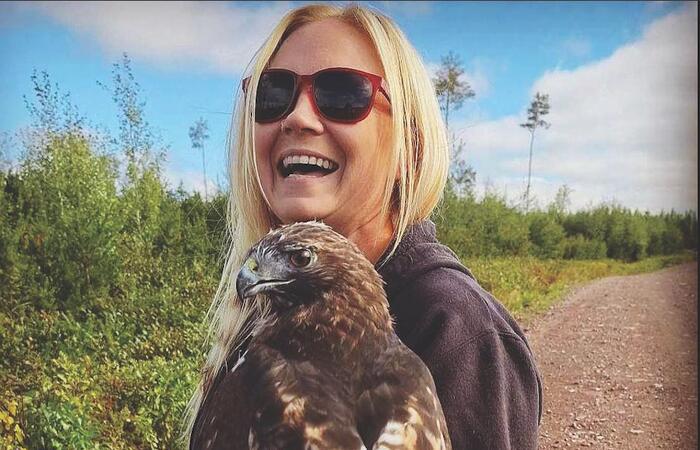Jenn Salo has a dream and it has wings.
You may recall Jenn from an article in Bayview’s March 2020 magazine about her hawk, Sitka, and her desire to build a wildlife refuge in Thunder Bay for rehabilitated birds of prey.
Well, it’s finally happening.
In April of 2022, Jenn went before city council and sought permission to use the abandoned Chippewa Wildlife Park, along with its pens and buildings, to house injured hawks and falcons until they recovered and could be set free. She was given access to a building and an outdoor pen in November 2022.
Jenn is an expert in birds of prey and is an encyclopedia of knowledge when it comes to caring and bringing them back to good health.
“I receive about 50 calls a year for injured birds of prey from the people in Thunder Bay and the surrounding area,” Jenn says, as she cradles a malnourished hawk in her arms. “This guy came to us a couple days ago, extremely dehydrated and needing lots of care. Without our intervention he would have died.”
There is a great need for assisting and rehabilitating injured wildlife. “I receive many calls, texts, and emails from people in Thunder Bay, Nipigon, Marathon, etc., who have found an injured bird or wild animal,” Jenn says with a sigh. “But until we get this place built and functioning as a rescue for multiple species, I can only offer words of advice. Currently I only hold a provincial permit to treat birds of prey such as eagles, hawks, owls, falcons and vultures.”
Many times, the situation is more complex than bringing in an injured bird and giving it food and water and a safe place to stay. Often these birds have broken wings and need x-rays and pain medication to help them recover.
“I wish I had the finances to save every bird that comes along, but I don’t. Sometimes it can cost hundreds of dollars to provide proper veterinary care for an injury. An x-ray alone costs just under $200. I need to focus on the birds I can save. I spend hundreds, sometimes thousands on a rescue.”
As we toured the sanctuary, Jenn’s enthusiasm grew – because she wants to do more.
“I want to do something wonderful for these animals and for the people of Thunder Bay,” Jenn says as she sweeps her arm across the sanctuary, pointing out the various pens needing repair. “I want to do something that has never been done in Ontario, or in Canada, for that matter. I want to create a wildlife refuge for not only birds of prey, but for all types of wildlife needing a safe place to recover from their injuries.”
“Most people are unaware that there are no other wildlife rescues this side of Lake Superior,” Jenn says. “Chippewa has the potential to be a very large rescue site and could host a wider variety of species because of the already existing infrastructure. This is exactly why I worked so hard to get access to this site.”
Too many times, Jenn admits, people don’t know what to do when they find an injured animal. For example, people often add to a bird’s injuries by trying to trap it in a net. Simply placing a blanket over the bird will contain it without hurting it.
Jenn maintains that it is very important for people to understand that not just anyone can rescue a wild animal. In many of these cases the animal is fed the wrong type of food and/or it is improperly imprinted on humans, making them non-releasable. “If a person finds an injured animal, they need to do the right thing and contact Ontario Wildlife Rescue and ask for the nearest wildlife custodian for that species,” Jenn says.
Some of the birds Jenn currently has in her care include a group of fledglings that are around the same age: a broad-winged hawk, two merlins and a kestrel hawk. These birds would not be together in a “normal” situation in the wild, but because they’re young, the larger hawk doesn’t see the merlins and kestrel as prey. “We’re going to be releasing them soon,” Jenn says with a grin. “They’ve all healed nicely and they know how to hunt. They’ll be fine.”
Jenn also wants the sanctuary to be self-sufficient. “We want to provide food that is a natural part of their diet to our injured animals. It’s very important in their recovery, as food found in the grocery store doesn’t have the same taste or nutritional value that these birds need.”
Several places have donated materials, including Meadows Veterinary Clinic who gave their kennels when they closed their doors. But the rescue is still in need of items such as towels, blankets, sheets, clean fresh food-quality hay, 2 x 2 cement blocks and old rabbit cages, as well as medical supplies like gloves and syringes. They will also require cleaning supplies such as paper towel and soap, and specialized equipment like incubators and brooders. There is also a need for an oxygen tank which would be used to help birds who develop asper, a fungal infection that can kill a bird when they become too stressed. If you would like to donate materials, you can message them on Facebook at www.facebook.com/thunderbirdraptorrescue.
The group is also offering opportunities for the public to sponsor a bird and help with the finances needed for its recovery. You can visit their Facebook page to learn more.
Thunder Bird Wildlife Rescue is a registered charity and donations can be made through Canada Helps or directly to thunderbirdwildlife@gmail.com


